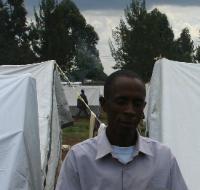ELDORET, Kenya -- As he stands amid the rows of mud-strewn tents, Eliud Njoroge recounts a familiar tale in the narrative of this country's recent post-election crisis. Njoroge, an ethnic Kikuyu, had lived for 32 years in the Kalenjin town of Soy, a stronghold of Raila Odinga, the opposition candidate in last December's presidential election. When violence erupted following the contested victory of the incumbent Mwai Kibaki, a Kikuyu, Njoroge's house was burned by machete-wielding youth, and his life threatened by neighbors who demanded that he and his family return to Central Province, the Kikuyu ancestral homeland, where they'd never actually lived. Fearing for their safety, they took refuge at the police station before being shipped here to the ASK Showground, home to a soggy camp for internally displaced people that eventually became home to 16,000. Seven months later, Njoroge is one of 4,000 that remain, left behind by a country set on moving forward, yet seemingly indifferent to the plight of those still stranded. "I lost everything," he recalls with the weariness of a man twice his age, gesturing to the number 769 scrawled in marker on the side of his white canvas tent, his ASK Showground identity. "My home was burned, my possessions looted. I arrived here with only the clothes on my back."
As Kenya Rebuilds, Thousands are Left in the Shadows

